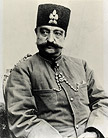The Age of Empire
The great age of Muslim Empires reached its broadest extent in the sixteenth century, covering an area of the globe stretching from southeast Europe and North Africa in the west to the Indian subcontinent in the east. These empires were initially established through military conquest, and leaders ruled through a system in which the government provided military defense and good order for its subjects in return for taxes. As long as both rulers and ruled kept their side of the agreement, the actual day-to-day interaction between them was infrequent. A subject’s local government played a much more prominent role in his or her daily life than the imperial government. A local notable, usually a landowner or prominent religious figure, often served to represent subjects’ concerns to imperial officials.
This model of government began to change in the 1700s, and that change accelerated dramatically in the 1800s. There were a number of causes. One of these was economic. Muslim empires were traditionally dependent on land tax as their primary source of income, as well as taxes on trade and transportation. When these empires needed more money, one important means of increasing revenue was acquiring new lands through conquest. However, by the 1800s Muslim empires were facing European military powers that were industrializing and beginning to win more battles than their Muslim counterparts. In response, Muslim empires undertook extensive, and quite expensive, programs to modernize the military and the men who served in it. This created a demand for even more tax revenue, at a time when the empires were also beginning to lose ground to Europeans in the realm of trade. Moreover, new capital-intensive and technologically advanced infrastructure, such as railroads and telegraphs, became important for both economic and military reasons. The result was that states such as the Ottoman Empire, Qajar Iran, and Egypt under the Khedives took out loans from bankers in Europe — only a few at first, but larger, more frequent, and under worse terms as time went on. As well as the loans, there were also agreements, called concessions, with private European individuals and firms, for the development of infrastructure and natural resources. The foreign investors provided capital and know-how in return for monopolistic control of the sector or resource for a fixed and generally extended period. This put important sources of revenue and sectors of the economy largely under foreign control. These economic strains had political repercussions, both in the way imperial government was run and in the autonomy Muslim governments were able to exercise vis-à-vis European governments.
Politically, the mechanisms of empire also began to change. Both members of the ruling elites and subjects began to rethink their relationship, questioning whether the absolute imperial authority of the past was the best way forward. In the latter part of the nineteenth century, rulers like the Ottoman Sultan Abdulhamid II defended autocratic rule, but also began to show an interest in popular opinion and to use propaganda to generate support and legitimacy for the regime. Another major part of this reexamination was the increasing call to place legal limits on the powers of the ruler (shah or sultan) by means of a constitution. As individuals across the Muslim world embraced the notion that they had individual rights, they wanted legal mechanisms to protect those rights from imperial whim. Constitutions were seen as the most effective way of achieving this goal — an idea not always popular with existing rulers. The late nineteenth and early twentieth century in the Middle East was characterized by back-and-forth tension between constitutionalists and those who supported autocratic rule.

A. Holly Shissler
Associate Professor of Ottoman and Modern Turkish History, University of Chicago
 Erin L. Glade
Erin L. Glade
Ph.D. candidate, University of Chicago
Guiding Questions
1. How did European ideas and political and economic interests impact the culture, politics and economics of the Middle East?
2. What were the driving forces behind the formation of nation-states in the Middle East?
3. How has the history of the transitions between Islamic empires and modern nation-states in the Middle East set the stage for later political, social and/or religious conflicts?


 Print Page
Print Page

